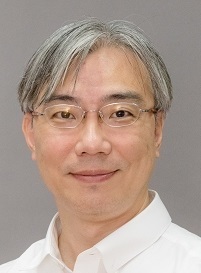Professor
Prof. Wang, Hao-Ven
Prof. Wang, Hao-Ven
中文
TEL:+886-6-275-7575 ext.58130 研究室:58104 or 58114轉21
Email: hvwang@mail.ncku.edu.tw
Research interests:
We are interested in the mechanism of integrin and cytoskeleton-associated protein (e.g. β1 integrin, kindlin, palladin) signaling. We use techniques of biochemistry, molecular biology, cell biology, gene knockdown and gene knockout to approach the dynamic interaction of these proteins.
Research aims:
TEL:+886-6-275-7575 ext.58130 研究室:58104 or 58114轉21
Email: hvwang@mail.ncku.edu.tw
Research interests:
We are interested in the mechanism of integrin and cytoskeleton-associated protein (e.g. β1 integrin, kindlin, palladin) signaling. We use techniques of biochemistry, molecular biology, cell biology, gene knockdown and gene knockout to approach the dynamic interaction of these proteins.
Research aims:
- Characterize the different splicing variants of the cytoskeleton-associated protein, palladin.
- The role of palladin protein in myogenesis.
- The study of the development and the regeneration of cetacean skin.
Education
| Dr.rer.nat. | Faculty of Chemistry and Pharmacy, Ludwig-Maximilians-University Munich, Germany Dep. of Molecular Medicine, Max Planck Institute for Biochemistry, Martinsried, Germany |
| Master Degree | Institute of Botany, National Taiwan University, Taipei, Taiwan |
| Bachelor’s Degree | Department of Biology, National Cheng Kung University, Tainan, Taiwan |
Experience
| 2021.08~present | Professor | Dep. of Life Sciences, National Cheng Kung University |
| 016.05~present | Director | Marine Biology & Cetacean Research Center, National Cheng Kung University |
| 2015.08~present | Director of Planning Section | Center for Bioscience and Biotechnology, National Cheng Kung University |
| 2015.08~2021.7 | Associate Professor | Dep. of Life Sciences, National Cheng Kung University |
| 2015.02~2015.07 | Director of Education Section | Center for Bioscience and Biotechnology, National Cheng Kung University |
| 2009.08~2015.07 | Assistant Professor | Dep. of Life Sciences, National Cheng Kung University |
Awards and Honors
Publications
Conference paper
- Ngoc-Uyen-Nhi Nguyen and Hao-Ven Wang. (2015, Dec.) A potential role of actin-associated protein palladin in preventing cachexia. 8th Cachexia Conference. Paris, France.
- Tz-Yu Liu, Chun-Yen Lu, and Hao-Ven Wang. (2014, Aug.) Identification and Characterization of Promoters of Murine Palladin Isoforms. 2014台灣發育生物學研討會. Keelung, Taiwan.
- Ngoc-Uyen-Nhi Nguyen and Hao-Ven Wang. (2014, Aug.) Palladin negatively regulates myoblast differentiation through suppression of muscle differentiation genes. 2014台灣發育生物學研討會. Keelung, Taiwan.
- Chia-An Liu*, Chen-Chuan Kuo*, Wen-Chieh Tsai, Jiang-Ping Wang, Hao-Ven Wang. (2014, Aug.) Transcriptomic analysis of dwarf sperm whales (kogia sima) skin by next generation sequencing technology. 16th Annual Meeting of Society of Evolutionary Studies, Osaka, Japan. (*: equallay contributed)
- Tz-Yu Liu, Chun-Yen Lu, and Hao-Ven Wang. (2014, Jan.) Identification and Characterization of Promoters of Murine Palladin Isoforms. The 22nd Symposium on Recent Advances in Cellular and Molecular Biology. Kenting, Taiwan.
- Chia-An Liu, Vincent Liang, Ngoc-Uyen-Nhi Nguyen and Hao-Ven Wang. (2014, Jan.) Characterization of Cytoskeleton-associated Protein, Palladin, in Myogenesis. The 22nd Symposium on Recent Advances in Cellular and Molecular Biology. Kenting, Taiwan.
- Ngoc-Uyen-Nhi Nguyen and Hao-Ven Wang. (2014, Jan.) A dual role of Palladin in myoblast migration and differentiation during skeletal muscle myogenesis. 2014 Keystone Symposia Conference – Growth and Wasting in Heart and Skeletal Muscle. New Mexico, USA.
- Ta-Yu Yun, Chun-Yen Lu, I-Chu Lin, Tz-Yu Liu, Hungjiun Liaw and Hao-Ven Wang. (2013, Oct.) Palladin interacts with SH3 domains of Nebulette. 第38屆中國生物學會-受威脅下的生物多樣性研討會. Tainan, Taiwan.
Books
- 王浩文、廖國媖(2016.11):<成大校園生態導覽> 。國立成功大學總務處。164 pp.。(ISBN 978-986-05-1094-2, In Chinese)
- 梁敏聖、劉家安、王浩文(2013.11):<生物多樣性之基因看天下>生物資源與生物多樣性 p.31-42。里仁書局。(ISBN 978-986-6178-69-6, In Chinese)










